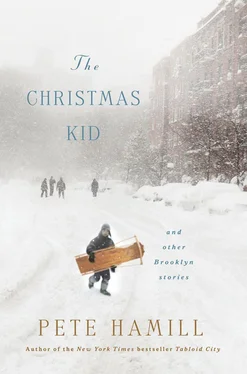“Do you have someone in here, Mr. Bondanella?” she asked in her throaty voice. “If you do, I want the room.”
He opened the door wider. “Of course not, Mrs. Reilly. I was just, you know, humming a tune, I guess. Or maybe talking to myself.…”
She glanced past him, her colorless eyes prepared to prosecute at the first sign of sin. “Well, have a nice day, Mr. Bondanella,” she murmured in a disappointed voice, and went out through the hall doors to the stoop. Bondanella’s heart pounded. That night, he took the tomato to bed. He placed her in a small bowl so he wouldn’t roll over and crush her, and he slept solidly, a man content and complete.
Now there was a new element to his routine. In the evenings, he hurried home, picking up food at the deli or the Chinese take-out place. He would gaze at the tomato while he ate, enchanted by her plumpness, her size, her quiet beauty. By Wednesday, the streaks of green were gone; she had survived adolescence. He entered her gently in cool, clear water, drying her with a soft cloth. And she inhabited his dreams. Once, he came home in a dream and the tomato was sitting in a chair, with sewing beside her. In another dream, she wore a veil, mysterious and sensual, peering at him from a corner of the room. And there was a time when she grew to fill the entire room, from wall to wall, keeping Bondanella in and Mrs. Reilly out.
“You’re so beautiful,” he said one night that first week. “You’re so perfect. I wish you could speak.…”
And then he knew that somehow he was sure to lose her. She was, after all, mortal. And knowing that, Bondanella became angry. He cursed fate, the universe, nature, God. He had lived a long solitude, and suddenly, absurdly, the solitude had been broken, and he knew that the union would be only an interlude. And knowing that, Bondanella held the tomato to him and rubbed her smooth skin against his cheek and began to cry.
The next day, he called in sick for the first time in nine years. There was so little time left. He took her to Coney Island, showed her the beach, took her on the Cyclone and the merry-go-round. He whispered to her in the wax museum. He explained to her about the clam sandwiches at Nathan’s. They went home for a nap, and that night he took her to Yankee Stadium, trying to make clear to her the elegance of the game. The next day it was the Statue of Liberty, and Washington Square Park and the Empire State Building. She was very brave, and Bondanella had never been more charming, more full of life.
When she began to fade, he put her back in the bowl and laced the cool water with vitamins and herbs. He talked about winter trips to the country, about getting tickets in the spring for La Cage aux Folles . But nothing reversed; youth was gone; she shriveled into inevitable old age. Bondanella found himself talking to her without actually looking at her. He wanted to remember her the way she was.
He buried her on a starry Saturday night in Prospect Park. He found a thicket on the hill beside the Quaker cemetery, dug quickly and furtively with a soup spoon, and laid her gently in the dark, moist earth. He made a triad of smooth stones to mark the spot, and then said a short prayer. It was over. At the end, he looked up at the sky, at the infinity of stars, let out one aching cry of loneliness and loss, and then walked in silence down the hill and back into the safe routine of his life.
ALMOST EVERYBODY LOVED WONDERFUL Kelly. He had a wonderful wife and three wonderful kids and lived in a wonderful house on Fuller Place, two blocks from Holy Infant Church. They thought he was wonderful at the church, too; he was an usher at two Masses every Sunday, he helped coach the eighth-grade softball team in the spring and the football team in the fall. In the summer, he always volunteered to take the poorest kids to Coney Island or the Sunset Pool. He had a good job in one of the neighborhood banks. He didn’t smoke. He didn’t drink. Just a wonderful guy.
“You’re so lucky, Carol,” the women would say to Kelly’s pretty young wife. “You’ve got a wonderful guy. Not like some of the bums we married.”
Carol Kelly would smile in a shy way and keep walking up the avenue to the meat market or the hardware store, trailing her wonderful children. There were, of course, some neighborhood dissenters. Most of them could be found on a Saturday afternoon in winter, peering through the steam-fogged windows of Rattigan’s Bar and Grill, while Wonderful Kelly strode along the avenue. Dinny Collins, the bus driver, was one of them.
“Lookit this guy,” Dinny said one afternoon. “Walking along, bouncing on the balls of his feet, breathing in that clean winter air, his skin all pink and healthy. Lookit the hair. The guy’s forty but his hair’s black and he looks twenty-five. It makes you sick.”
“Come on, Dinny. Everybody says he’s a wonderful guy.”
“Oh, yeah? What’d he ever do for you that’s so wonderful? I’ll tell you. He did for you exactly what he did for me. Nothing. So how wonderful can Mr. Wonderful be? Could he make me fifteen years old again? Can he get me a raise? Can he pick me a winner at Belmont? What is this ‘wonderful’ crap, anyway?”
“The wives like him.”
“They would,” said Dinny Collins, who lived alone, a knockout victim in the marriage tournament. “They’ll like him even more when he goes to heaven.”
That summer, Wonderful Kelly extended his good works into the saloons. He said he was shocked by the high rate of neighborhood drunkenness, especially among married men. And he convinced the church to host a meeting of Alcoholics Anonymous in a large basement room on Tuesday nights. Then he started touring the bars, talking to each drunk in his quietly wonderful way about the evils of John Barleycorn, as he called it. Dinny Collins, of course, ignored him. What did Wonderful Kelly know about drinking? He’d never even been a drunk. But Wonderful did recruit some of the men, and when the existence of the AA meeting became known, a number of the wives issued ultimatums to their husbands: join AA or sleep in the subway.
After several weeks, a few former drunks could be seen nursing club sodas at the bars, even in Rattigan’s. They told stories about the meetings, how everybody got up to describe what alcohol had done to them, the wreckage it had caused, the chaos it had fueled. Coffee and tea and doughnuts were served, and priests were available for those who wanted to make general confessions, cleaning their slates of decades of mortal and venial sins. Kelly was, of course, delighted.
“I feel like a million bucks,” Charlie Deane said one night. “I’ll never touch this stuff again.” He was sitting on his usual stool at the bar. His pants were pressed, his hair neatly trimmed, his face closely shaved. “The wife even talks to me now. First time in three years.”
Dinny Collins scoffed. “Wait’ll you hear what she’s been saying. You’ll want to get stewed another three years.”
A few of the converts did fall off the wagon; but many stayed dry. Kelly’s stock in the neighborhood rose even higher. The monsignor of the church wrote a note to the archbishop, telling him how wonderful this fellow Kelly was; the archbishop wrote the bishop, and the bishop wrote to the president of Kelly’s bank. Within the month, Kelly had been named manager of the neighborhood branch. Everybody thought this was wonderful. Wives streamed into the branch to congratulate Kelly, and dozens moved their small accounts to Kelly’s bank. The first sign of Kelly’s wider prosperity was a new car. A small trophy, to be sure, but too much for Dinny Collins.
“Well, he got himself an early Christmas present,” Dinny said one Saturday afternoon that winter, watching Kelly drive by, his wife and kids in the car. “What’s next?”
Читать дальше












